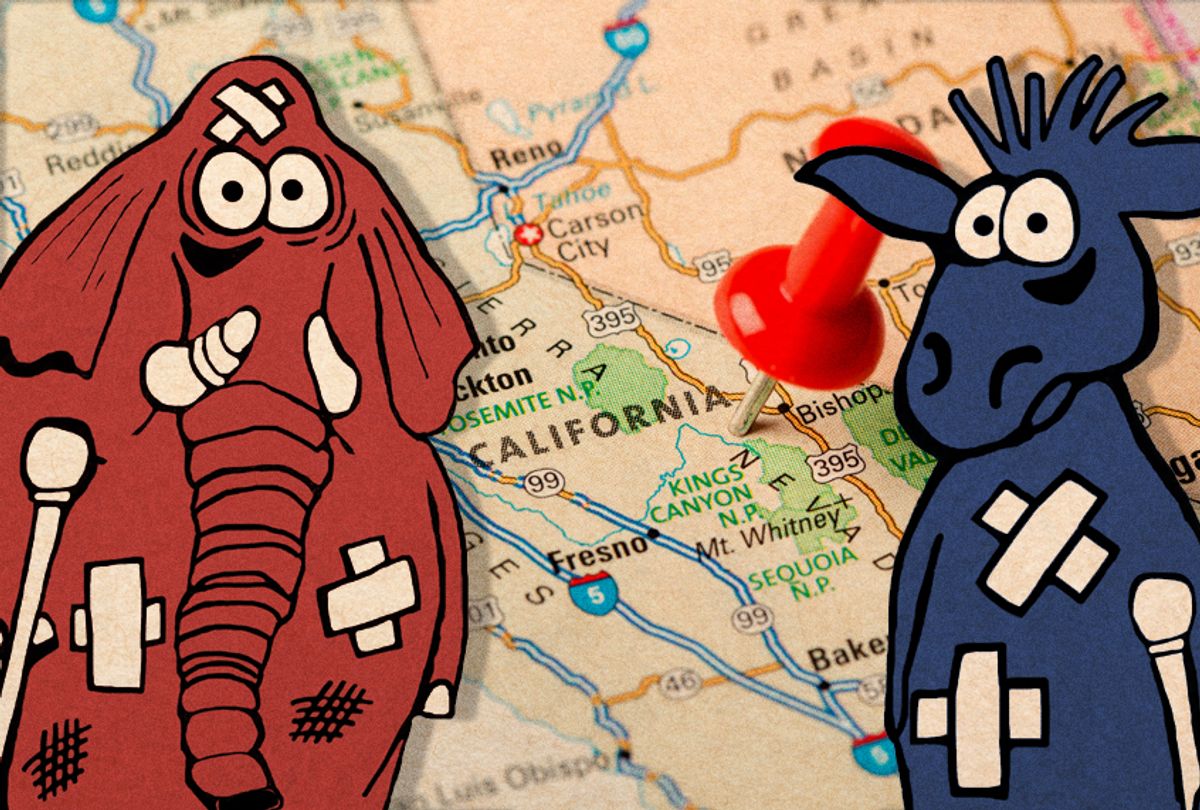If the political maxim that “demographics is destiny” failed to crystallize in the bizarre presidential election of 2016, Democrats in California remain confident that it has already proven true.
Republicans once dominated California, whose sprawling suburbs created the political base for both Richard Nixon and Ronald Reagan. But no Republican has held statewide office in the Golden State for more than a decade. Hillary Clinton won 61.5 percent of the state's vote in 2016 -- in fact, her margin in California exceeded her lead in the national vote total. Just last week, independents surpassed Republicans to become the second-largest bloc of registered voters in the state. Republicans have been on a downward slope in the state for more than 20 years and now look to be limping toward their inevitable extinction. Tuesday’s primary elections may make California the first state where one major party fails to field a general-election candidate for either governor or U.S. senator since 1914.
When Sen. Dianne Feinstein won her first Senate race in 1992, 47 percent of the state electorate was Democratic and 40 percent was Republican. Republican registration now hovers at about 25 percent in a state carried by GOP presidential nominees in almost every election between World War II and the rise of Bill Clinton. (Barry Goldwater's wipeout defeat in 1964 was the lone exception.) Thanks to the nonpartisan "top two" primary system now in use, there is a distinct possibility that Feinstein will face no Republican opponent in November. That would be the second Senate race in two years to feature two Democrats. (In 2016, Sen. Kamala Harris was elected after defeating Rep. Loretta Sanchez, also a Democrat, in the general election.)
Home to more than one-in-eight Americans and the world's fifth largest economy, California houses some of the most endangered Republicans in Congress — and they know it. Just 38 percent of California's population is white, and Latinos are the state's largest ethnic group. (Just to keep things in perspective, that's around 15 million white people, more than the entire population of Oregon, Washington and Nevada put together.) After trying to repeal Obamacare, swallowing Donald Trump's hard line on immigration and passing a tax bill that negatively targets high-tax states like California, Republicans in the state have a lot to defend in the Trump era. That’s probably why high-profile GOP incumbents like Reps. Darrell Issa and Ed Royce are not seeking re-election this fall.
But as California lurches toward becoming a one-party state -- it's likely that two Democrats, Lt. Gov. Gavin Newsom and former Los Angeles Mayor Antonio Villaraigosa, will also battle each other in the governor's race this fall -- the Democratic Party's once-in-a-decade shot at flipping the House is jeopardized by the very momentum that has energized Democrats in the state.
Democrats in California have good odds of picking off as many as seven Republican-held House seats in November — if an overcrowded field of candidates doesn't spoil the party. California's "jungle primary," adopted by voters in a 2010 referendum and implemented in 2012, means the top two vote-getters on Tuesday — regardless of party affiliation — will face off this fall. This system was designed to take naked partisanship out of politics, but it now threatens to shut out both Democrats and Republicans in key races this fall after Tuesday’s vote. If the theory behind the “jungle primary” was that candidates would be forced to moderate their appeals to win a broader section of the electorate, in practice party leaders have been left scrambling to ensure that at least one of their candidates makes it onto the ballot in competitive races.
Traditional Republicans in onetime GOP strongholds like Orange County may have split their votes between Hillary Clinton (who won every region of California) and their GOP congressmen. Now there are signs of a blue wave cresting in California. According to recent polling, even within California’s remaining GOP-held districts, Trump’s approval rating only climbs to 41 percent, while 59 percent disapprove, leaving even seemingly safe Republicans like House Intelligence Committee Chair Rep. Devin Nunes feeling vulnerable. In all but one of the four Orange County House seats targeted by Democrats, Republicans outnumber Democrats in returned ballots, according to numbers from Political Data Inc.
Still, Democrats may be their own worst enemy. In at least two of the top target House races, for example, Democrats are in real danger of getting shut out because they have too many candidates competing for too few votes. So one possible outcome is that Republicans win the top two positions, even if far more voters support Democrats.
Democratic groups have poured millions of dollars into congressional races to avert such a self-inflicted disaster. But this Democratic disorganization could well save 15-term Republican Rep. Dana Rohrabacher, a close Trump ally, who clearly ought to be vulnerable. The Democratic Congressional Campaign Committee has split from the California Democratic Party in that race in the 48th congressional district; the former group has endorsed one candidate, Harley Rouda, while the party backs another, Hans Keirstead.
Although Latinos account for just 18 percent of likely voters, according to the Public Policy Institute of California, the state’s demographic shift has already doomed the Republican Party to irrelevance. Maybe that’s why a recent poll by the Los Angeles Times indicates that 50 percent of voters in the deep-blue state still approve of the system they voted into place in 2010. If Tuesday’s elections effectively end Democrats’ quest to take back the House, look for voters to cry foul and begin clamoring for another new set of reforms that sound good in theory and may or may not work out in practice.

Shares